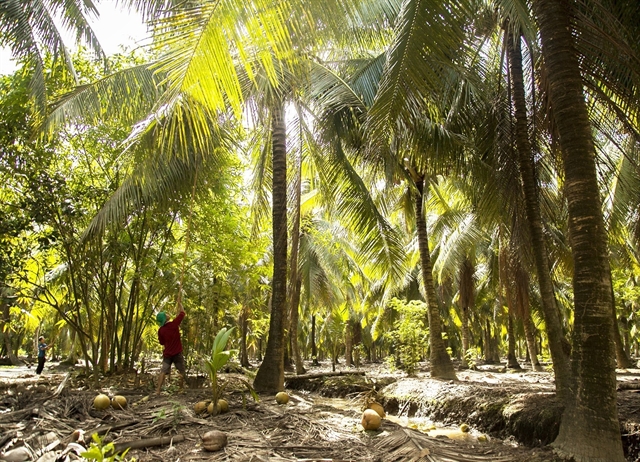 Society
Society

The Cửu Long (Mekong) Delta province of Bến Tre plans to have 30 per cent of coconut grown to organic standards by 2030.

|
| An organic coconut grove in Bến Tre Province’s Thạnh Phú District. – VNA/VNS Photo Hồng Đạt |
BẾN TRE – The Cửu Long (Mekong) Delta province of Bến Tre plans to have 30 per cent of coconut grown to organic standards by 2030.
With around 77,000ha of orchards and an output of 700,000 tonnes a year, it is the country’s largest coconut producing province.
More than 16,000ha have organic coconut grown, mostly in Giồng Trôm, Mỏ Cày Nam, Bình Đại, Thạnh Phú, Ba Tri, and Mỏ Cày Bắc districts, under contracts with processing companies.
Huỳnh Quang Đức, deputy director of the province Department of Agriculture and Rural Development, said the focus is on developing farmers’ linkages with each other and with companies.
The province has also assisted co-operatives and co-operative groups to improve their capacity and efficiency in making coconut products for value chains, he said.
It has successfully developed coconut growing areas meeting international organic standards and value chains for them, he said.
There are 100 local companies that make high-value products and many export them, he added.
The province has 47 coconut co-operative groups and 27 co-operatives, and plans to set up at least another 13 co-operatives by 2025.
The Thới Thạnh Agriculture Co-operative in Thạnh Phú District’s Thới Thạnh Commune has nearly 120ha of organic coconut and sells 100,000 nuts to the Lương Qưới Coconut Co. Ltd a month.
Trần Quốc Ửng, chairman of Thới Thạnh, said jam is made from the nuts and exported to the US.
Organic coconuts fetch VNĐ15,000-20,000 more per dozen than normal coconuts, he said.
Nguyễn Văn Diện, who grows organic nuts on 4ha grove in Thới Thạnh Commune, said organic farming offers high yields and he harvests four times a year and earns VNĐ190-250 million (US$7,900 – 10,400) each time.
The province is developing five concentrated organic farming areas with a total of 1,500ha for harvesting mature nuts for their flesh and another of 20ha for young ones for water.
But the department, in co-operation with processing companies, localities and farmers associations, also plans to strengthen advocacy to encourage farmers to adopt organic standards.
It will teach them how to grow organic coconuts and make organic fertilisers to help reduce costs. – VNS




